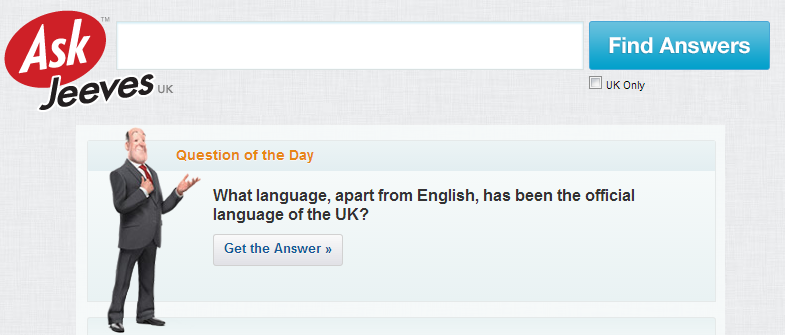Looking for a light hearted approach to consumer research for a Friday afternoon? Our very own Simon Howarth (yes the one from our fantastic Christmas video) takes a wholly scientific approach to finding out about how search engine novices use the web to find what they want and what they really know about the complex world of SEO… over to Simon…
A good user experience is Googles end game; Larry Page went so far as saying
“The perfect search engine would understand exactly what you mean and give back exactly what you want.”

But what exactly is it that a user wants from their search engines? I asked my good friend and housemate Victoria how she thinks search engines work and how she uses search engines.
Hello Vicki, what do you think ‘SEO’ stands for?
“Search Engine Overload? …I’m not sure.”
Close, it stands for Search Engine Optimisation. Can you name 5 popular search engines?
“Google, Yahoo, Bing, Ask Jeeves, I actually cant think of a 5th. I think Google is the most reliable. I trust Google.”
*To be honest I’m not surprised that she couldn’t name 5 search engines; it’s also not really surprising that they are all English language search engines.
I was surprised she included Ask Jeeves in her list as it had less than 2% search volume in the UK in 2012.*
Why do you trust Google?
“I think it’s the most recognised and internationally used. It’s also easy to use and I like how they update their page with current events.”
Do you mean the Google doodle or news results?
“The Google doodle thingy.”
How do Search engines, like Google, determine who is at the top of their results?
“Relevance to what you have searched, and erm… advertising.”
*It’s a very basic answer but it is along the right lines. Vicki also recognised that the very top of the results are paid for which is reassuring- not all users are even aware of this which must make some mistrust Google’s ability to correctly judge relevance. With the shading of the search box ever- changing and fading it can be hard to tell the paid from the organic ads even despite the ‘ad relating to’ indicator*
How do the search engines know what’s relevant to what you have typed in?
“Doesn’t it bring up relevant results as youre typing…?”
*Interestingly Vicki is conscious of the predictive search or so called ‘Instant Search’ that Google introduced in 2010. Google claimed the feature would reduce the time spent on search by two to five seconds per request, saving its billions of users about 350 million hours a year. When it was introduced it did receive some controversy – because their search formula draws heavily upon common search requests, the instant results were said to be biased toward featuring major brands during the first few characters of a request. Google’s co-founder Sergey Brin, confirmed at its launch that its introduction could “conceivably hurt smaller merchants if people stop typing after the first few keystrokes and accept the results that show up the most quickly.”*
Yes, suggested instant results are based on a number of factors including your location and most common searches. The newer the story is seems to affect the priority of the results too…
…”Dont big companies like Microsoft, ASOS, the big brands, get priority anyway? Like if you search for illness NHS will come up.”
*Vicki’s totally right in her first statement, well to some degree anyway and I quickly search for ‘illness’ to see if her theory is correct. An NHS page is result #5 but it’s not the NHS homepage.*
I’ve just searched for illness and the NHS isn’t the top result, its actually 5th, what is your opinion on that?
“What were the top 4?”
Wikipedia, thefreedictionary.com, thesaurus.com, and a recent news story from the Guardian…
“Well I would’t trust the first 3; anyone can change Wikipedia so anything could be on there. The news story is fair enough, but I would expect the NHS to be first. If I was searching a broad term like illness I suppose I would go direct to a site like the NHS.”
So if you were looking for a cure for hay fever for example, would you even use a search engine?
“No I would go straight to the NHS website”.
OK, what if you were looking for a good monetary exchange rate? (I know Vicki is about to go on holiday)
“I’d Google ‘travel money’, then look at the brands that I recognised.”
*It appears brand awareness and trust is still very important for the user experience – people prefer to visit brand sites they already know – this proves that brand awareness activity can still be an important part of the marketing mix.*
How far down a results page would you actually look at the results?
“I’d probably only scan the top 4 or 5 results.”
What would you do if you didn’t find what you were looking for there?
“I suppose I’d have to do a more detailed search.”
*Although this is a very small sample, we can still gain an interesting insight into how an SEO novice uses search engines. We know users trust Google, its cornered the market and become a brand in itself. The Google doodle also attracts users, and the Google doodle is a fantastic example of great, engaging, fresh content.
Brand trust is still very important to people when searching, but it must also be noted that in broader searches Vicki only looked at the top 4 or 5 results before retyping a longer tailed keyword. While big brands have some advantage in broad keyword searches, smaller businesses can take advantage of the long tail keyword searches many prospective customers are forced to use when they can’t easily find what they are looking for in the first instance.*
Like Simon, Search Laboratory has been interested in how users search the web for some time and is continuing its scientific approach to finding out consumer search habits by surveying hundreds of people online.
You can help us by participating in our survey for a chance to win £100 of LovetoShop vouchers! We want to know how you search the web to find information and products… so contribute your thoughts by answering these quick questions or by leaving a comment below!
Disclaimer: The survey is now closed



